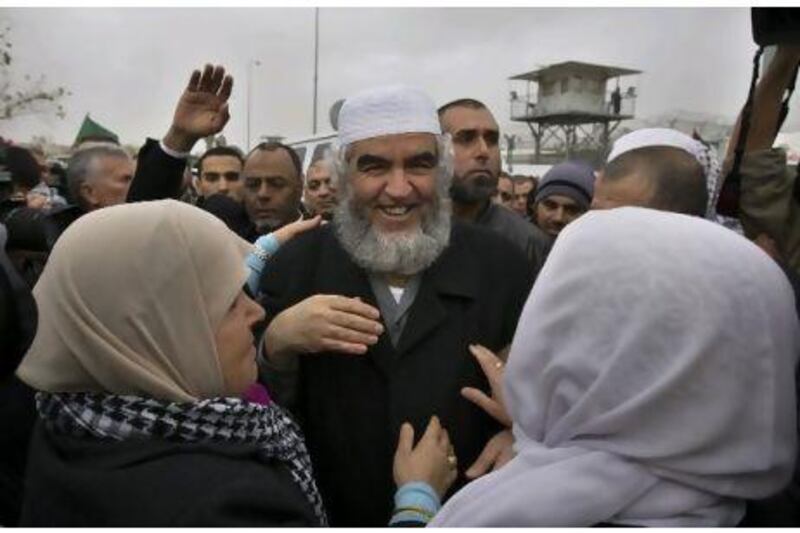NAZARETH // Efforts were under way by the British government yesterday to deport the leader of Israel's largest Islamic group after he was arrested on charges of entering the country illegally.
Sheikh Raed Salah, head of the Islamic Movement and a vocal critic of Israeli policies, was detained at his London hotel on Tuesday.
His arrest came as he was preparing to address a meeting yesterday in the British parliament attended by several MPs.
Sheikh Salah arrived in Britain on Saturday, clearing border checks, despite a reported exclusion order issued by the British home secretary, Theresa May, last week.
Yesterday, Mrs May said steps were being taken to remove Sheikh Salah from Britain. "A full investigation is now taking place into how he was able to enter," she said.
The Home Office said his presence was "not conducive to the public good".The government's hard line against Sheikh Salah follows a campaign by pro-Israel groups in Britain, backed by right-wing newspapers, alleging he had a history of making anti-Semitic statements.
Sheikh Salah, who has denied the remarks, was reported to be planning to sue the newspapers over their reports. His lawyer, Farooq Bajwa, said Mr Salah hoped to fight his deportation, pointing out that he had made "no attempt" to conceal his identity or lie about the purpose of his visit.
Sheikh Salah is a controversial figure among Israeli Jews. He has been arrested several times and jailed twice, for contacting a foreign agent and spitting at a policeman.
He also travelled on last year's aid flotilla to Gaza that was stormed by Israeli commandos, leading to the deaths of nine activists on-board.
Britain's Daily Mail branded Sheikh Salah a "preacher of hate" and "a militant extremist" on Tuesday, before his arrest, describing Britain's border controls as a "joke".
Sarah Colborne, director of the Palestine Solidarity Campaign, which invited Sheikhr Salah to Britain, said: "This shocking move by the British government will deeply damage British relations in the Middle East."
Arab leaders in Israel criticised the arrest, and were due to issue a formal protest to the British embassy in Israel. Haneen Zoubi, an Arab member of the Israeli parliament, said the British government had "caved into pressure from the Zionist lobby".
She said lobby groups wanted to "silence" Sheikh Salah for his criticisms of Israel's "systematic discrimination" against its Arab citizens, a fifth of the population.
Sheikhr Salah has angered Israeli officials by accusing Israel of trying to take over a holy compound in Jerusalem's Old City that includes the al Aqsa mosque. "[Sheikh Salah] is not an extremist," said Ms Zoubi. "But it is very easy for Zionsts in Britain to portray him as fundamentalist and racist by tapping into Islamophobic ideas."
Sheikh Salah had spoken about the Arab Spring to large audiences in Britain before his arrest.
However, an invitation for him to speak in the parliament building at a meeting entitled "Building peace and justice in Jerusalem", had provoked fierce criticism from Jewish groups and some British politicians. After criticism from the Board of Deputies, the main representative body for British Jews, officials from the opposition Labour party had urged three of its MPs not to attend.
Hassan Jabareen, the director of the Adalah centre for Israel's Arab minority, said Sheikh Salah had never been accused of advocating or participating in armed struggle, and had not been charged with incitement or anti-Semitism.
"Israel is one of the most security-obsessed countries in the world. If it believed he was a threat of any kind, he would be under administrative detention, or at the very least subject to a travel ban."
Sheikh Salah was freed from an Israeli prison in December after five months' incarceration for spitting at a policeman during a confrontation over Israeli excavations close to the Al Aqsa mosque.






